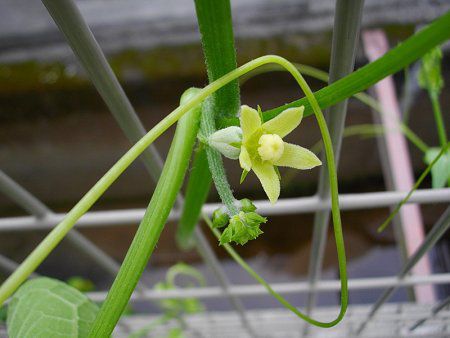Chayote
- Flower nameChayote
- Scientific nameSechim edule
- Aliasセンナリウリ, 隼人瓜, 千成瓜, チャーテ, チャヨテ, シャイヨット, Chayote, christophene, mirliton, vegetable pear
- Place of originCentral America and Mexico
- Place of floweringGarden, Field
- Flowering seasonSeptember, October
What is Chayote
Chayote or hayato uri , scientific name:Sechim edule, is a vines and perennial vegetables of the Cucurbitaceae Department of Sechium gennus native to Central America and Mexico . The edible fruit. October-unique flowers until frost down a 5 petaled flowers pale yellow. Fruit consisting of flowers after the surface is green or white pear-shaped, and off easily with a knife. Soft bite-shaped protrusions on the surface of the fruit. Origin of the flower name is imported from tropical America, in the Taisho era, Kagoshima-Prefecture, Japan (Hayato country). Many f,ruits are harvested from one, so aliases, also referred to as sennariuli (Sennari melon). How to cook the Peel vinegar, pickles, boiled, fried, eaten. Taste is Loofah and similar materials together and seasoning salt taste becomes dominant, so have a habit of Loofah, but taste is relatively candid.
Hayato uri (chayote) and pork stir-fry



Left: Hayato uri flower (photo by Kazuyo Fujita), center: fruit, right: pork and chayote stir-fry
The cooking method involves peeling the skin and preparing it in various ways such as pickles, simmered dishes, or stir-fries. Its texture is crisp, and its taste is somewhat similar to luffa (scientific name: Luffa cylindrica), with a slight bitterness. However, it has a relatively mild flavor, so the seasoning and the ingredients it’s cooked with tend to dominate the dish.
Common Name: Hayato uri (Chayote)
Scientific Name: Sechim edule
Other Names: Sennari uri (Thousand-bearing gourd), Chayote, christophene, mirliton, vegetable pear, Chayote (French: Chayotte)
Classification: Plant Kingdom, Angiosperms, Eudicots, Cucurbitaceae, Genus Sechim
Origin: Mexico and Central America
Vine Length: 400–1000 cm
Leaf Petiole: Long
Leaf Shape: Broadly ovate, shallowly 3-lobed
Leaf Margin: Coarse teeth
Leaf Arrangement: Alternate
Monoecious
Flowering Period: September to November
Inflorescence Type: Raceme
Inflorescence Length: 10–15 cm
Flower Color: Whitish green to pale yellow
Fruiting Period: October to November
Fruit Color: Green, white
Fruit Shape: Pear-shaped
Fruit Length: 7.5–10 cm
Uses: Edible










